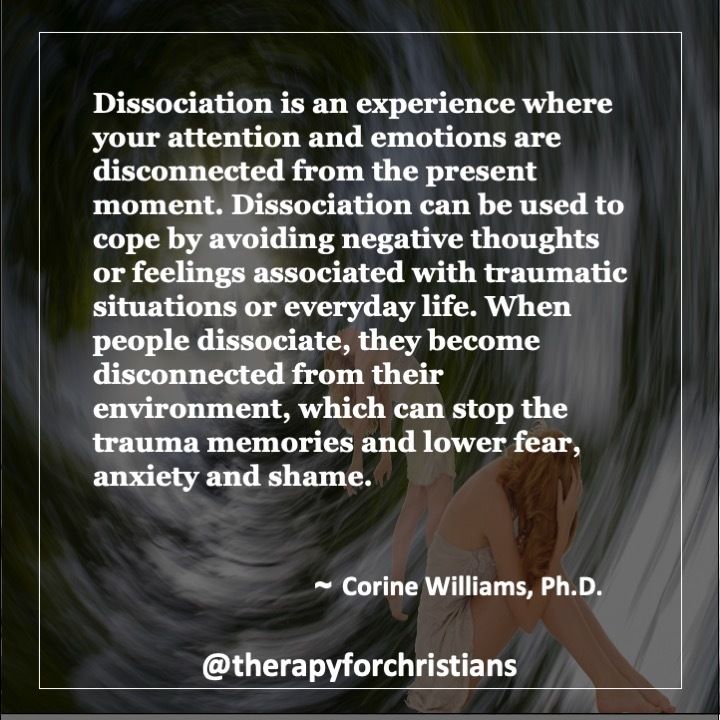
 Do you often find yourself so lost in thought that you feel disconnected from the world? Have you ever snapped out of a thought only to realize you've noticed nothing that was going on around you? Do you ever struggle to recall certain traumatic memories in your life?
Do you often find yourself so lost in thought that you feel disconnected from the world? Have you ever snapped out of a thought only to realize you've noticed nothing that was going on around you? Do you ever struggle to recall certain traumatic memories in your life?
If you answered yes to any or all of those questions, you may have a Like this content on Facebook dissociative disorder. This is a common mental health problem that often goes undiagnosed. So if you think you might have it, keep reading for some great tips to deal with a dissociative disorder.
Like this content on Facebook dissociative disorder. This is a common mental health problem that often goes undiagnosed. So if you think you might have it, keep reading for some great tips to deal with a dissociative disorder.
In this blog, I'll explain what dissociative disorder is and give you some tips that will help you overcome it.
What Is A Dissociative Disorder
According to the American Psychiatry Association, are characterized by difficulties with memory, identity, emotion, perception, conduct, and sense of self. Dissociative symptoms have the ability to impair all aspects of mental functioning. This condition gives the impression that your mind has been physically separated from your body, ideas, feelings, or environment.
The disorder pulls you away from the here and now into a world of your own, sort of like daydreaming. Now, not everyone who daydreams has a dissociative disorder, but when you live more in your mind than in reality, it is cause for concern.
This mental illness can affect your sense of identity as well as your perception of time. So it's important to diagnose it and treat it as soon as possible. Pin It
Pin It
What Does Dissociation Feel Like
Dissociation can feel different for different people. However, there are some things that are common in most experiences.
For starters, there is always some kind of missing consciousness when people experience a dissociative episode. You may feel like you're there but you're not really there, not consciously at least.
Another common feeling associated with dissociation episode is the feeling of being on autopilot. You know that you are saying and doing things but you feel disconnected from it all.
There are also people with dissociative disorders that have felt like they were outside of their bodies. It's as if they are watching what is happening without really experiencing it.
Then there's the memory aspect. Many people with dissociative behaviors tend to forget blocks of time. It's like they blackout for a while, and then have no memory of what they were doing before coming back to their senses.
These are just a few examples of what a dissociation disorder could feel like. There are many types of dissociative disorders and each type may come with different symptoms.
Types of Dissociative Disorders
The Diagnostic and Statistical Manual of Mental Disorders classifies dissociative disorders into three subtypes (DSM-5).
Dissociative amnesia
Dissociative amnesia is being unable to remember the details of certain experiences. This is especially when those experiences were traumatic or stressful. In some cases, you may have no memory at all, but there may also be patchy or vague memories.
Dissociative fugue, formerly a separate disorder, is a subtype of amnesia under the DSM-5. It may entail the temporary or permanent loss of one's personal identity, as well as the development of a new identity.
Depersonalization derealization disorder
Depersonalization derealization disorder is one of the most common types of dissociative disorders. This involves the feeling of being disconnected from your body or mind. It often feels as if you’re watching someone else’s life. And sometimes, you can’t even recognize yourself when you look in the mirror.
Dissociative identity disorder
Dissociative identity disorder is also known as multiple personality disorder. This disorder enables you to have more than one personality. In this condition, you could have multiple different personalities without even knowing that the others exist.
How Does Dissociation Work In The Brain?
When someone dissociates, both the fight-or-flight response system and the limbic system of the brain zones out. When both the emotion processing and reactive part of your brain is less active, it's hard to stay present. This is the reason so many people with dissociative disorders feel completely disconnected from themselves.
How Long Does Dissociation Last?
Dissociation can last for hours, days, weeks, or months. It all depends on the severity of the disorder, the person, and the steps they're taking to stop it.
8 Tips to Help You with Dissociative Disorders
Recognizing that you suffer from dissociation is one thing. Learning how to manage – or even reduce – the episodes is a separate task. Because dissociation involves a disconnect from reality, coping techniques that allow us to reconnect with our immediate surroundings are the most beneficial.
Know your triggers
Ever heard the saying "prevention is better than cure"? That quote is the perfect advice for someone dealing with a dissociative disorder. This disorder is usually triggered by the memory of a traumatic event. The memory can be triggered by encountering a similar event, place, or experience.
By identifying the things that trigger your dissociative disorder, you can take the steps you need to prevent it. This can be done by either limiting your exposure to triggers or creating ways to cope with them.
Learn grounding techniques
Grounding techniques are simple exercises designed to ground you in the present moment. These techniques are similar to being mindful, they help you stay in the present while reducing the risk of you slipping into dissociation.
To make use of grounding techniques, you will need to use your five senses. Each exercise involves doing something that will bring all your attention to the here and now.
Here are a couple of grounding techniques to try:
Sight- Look around you and make a mental list of everything you see. Ask yourself questions like: What do I see? What colors are they? How many of each thing can I see? These questions will force you to look at what's right in front of you, and therefore connect you with the present moment.
Smell - Smell something strong. Strong smells immediately bring you into the present moment reducing the risk of dissociation.
Sound - Turn up the TV, some music, or anything else that would be hard to ignore. When your attention is directed to loud noise, it will bring you back to the present moment.
Taste - Bite something strong like a lemon. The sudden sourness of the lemon will force you to remain in the here and now.
Touch - Touch something extremely cold or warm such as an ice block or a cup of tea. Holding something that's different from the natural temperature will help you remain present.
Exercise
Exercise is important whether you have a dissociative disorder or not. This is because it's good for both your mental and physical health.
However, in regards to dissociative disorders specifically, exercise can help you remain in the present moment as you need to ensure you're doing it right.
Practice self-compassion
It's easy to beat yourself up every time you dissociate but it's not fair. You're still here, you're still fighting and that's something to be proud of. Try being kinder to yourself and practicing self-compassion because you deserve it just as much as anyone else.
Talk to God
Pray out loud and tell God about your day. Tell Him how you feel and what you're worried about. Talking to Him in the present moment will keep you in the present moment.
Practice deep breathing
Dissociation is often triggered by the fight-or-flight response in our brain. One way to counteract that is to know how to soothe yourself through breathing.
I recommend practicing deep breathing. Deep breathing is a proven method used to regulate and calm your autonomic nervous system (ANS). It is a simple yet effective way to let your body and brain know that you’re safe.
Be intentional about dissociating
Sometimes disconnecting from the stresses of life is good.
That's why it's important to be intentional about it. If you think that stress is what makes you dissociate, carve out time in your day to intentionally turn your brain off.
You can safely do this by doing something that doesn't require brainpower such as watching a TV show.
Enlist the help of others
If you know that you're at risk for dissociative episodes, tell someone you trust. Even better if this person is often with you.
By letting others know about your condition, you’ll have more help to stay in the present moment and you won't feel like you're in it alone.
Engage in therapy
If you've tried all of the above and realized you can't stop dissociating on your own, consider therapy. A professional will have the ability to help you deal with your condition as well as the stress that comes with it. You can find a Christian mental health profession near you by searching our directory.
Medication may also be used to manage your symptoms in some cases.
If you’ve read this post and feel like you might have a dissociative disorder, don’t be scared and do not lose hope, the condition can be overcome. Just be sure to try all the tips I’ve mentioned and to get help if you need it. Also, remember to go to God in prayer because He is the greatest healer and He is always with you.
About the Author:
 Corine Williams, Ph.D. is Clinical Psychologist that is currently seeing clients in the States of Maryland, New Jersey, and New York. You can find out more about her practice by visiting www.therapyforchristians.com/corinewilliams. In addition to providing individual therapy, Dr. Williams is also passionate about writing books and designing merchandise that educate, uplift, and normalize mental health subject in the Christian community. You can find out more about her at www.booksbycorine.com or by visiting her amazon profile here: https://www.amazon.com/Corine-Hyman/e/B00AWZ5FL2
Corine Williams, Ph.D. is Clinical Psychologist that is currently seeing clients in the States of Maryland, New Jersey, and New York. You can find out more about her practice by visiting www.therapyforchristians.com/corinewilliams. In addition to providing individual therapy, Dr. Williams is also passionate about writing books and designing merchandise that educate, uplift, and normalize mental health subject in the Christian community. You can find out more about her at www.booksbycorine.com or by visiting her amazon profile here: https://www.amazon.com/Corine-Hyman/e/B00AWZ5FL2
Help us increase mental health awareness in the Christian community by donating through our paypal link here: www.paypal.com/therapyforchristians, joining our mailing list by clicking below, or join our provider list here: Provider listing
Disclaimer: the information, including but not limited to, text, graphics, images and other material contained on this article are for informational purposes only. No material on this site is intended to be a substitute for professional medical advice, diagnosis or treatment. If you are looking for a Christian counselor near you, please check out our directory located here: Christians Therapist Near Me
.png)








